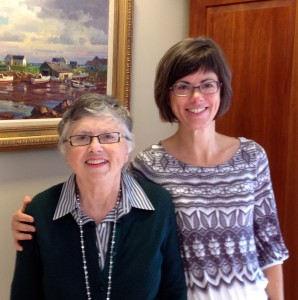One thing we’ve learned about Alzheimer’s care is that you don’t get what you pay for. Quality of care doesn’t correlate to cost of care.
For instance, my Mom was getting excellent care in the assisted living wing of the retirement village she lived in, a few buildings away from my Dad’s apartment. The facilities were lovely: she had a spacious, private room with an elegant seating area composed of Aunt Opal’s Queen Anne furniture. The staff was friendly and supportive, offering daily activities and keeping the place and residents clean and comfortable.
Despite the good care, in less than six months, Mom started falling. One of these falls happened when she was trying to stand up from a chair to her walker. She fell on her knee, fracturing her femur at the hip joint. From there, she went to the hospital, to surgery, and to the rehabilitation wing for physical therapy, costs mounting every roll of the wheelchair.
In physical therapy, she failed to make enough progress for the doctor to clear her for weight bearing activities, so in one of the great ironies of advanced modern medical care, the staff stopped exercising her, and the insurance company refused to pay for any more physical therapy.
Mom was left to lie in bed or lifted to sit in a chair. I don’t have photos from this hospital stay, but my sister’s report etched a vivid mental image of Mom slumping, bra-less in a loose shirt and stretch pants, her hair unwashed, no makeup or jewelry, listless and incoherent. For my mother, who always cared so much about appearances, her unkempt state must have been viscerally disorienting. She could not have felt like herself. The physical inactivity further assaulted her cognitive functions, since, according to my friend and colleague Dr. Kristi Multhaup, an expert in the psychology of aging, the single most important thing you can to do improve cognitive functioning is to get aerobic exercise.
Fortunately, my watchdog Dad intervened and managed to get her more physical therapy. Eventually, she was approved to move back to the assisted living wing—provided that he hire a private caretaker to assist her 24/7, which would make the total cost of her care $20,000 a month. Obviously, this was untenable.
Never fear, the retirement facility assured us, we can offer a more affordable option: a quad room in the nursing wing could be had for a mere $12,000 a month. Even if we could afford this option, the idea of my Mom sharing a room with three strangers in a dreary facility whose halls smelled faintly of urine was appalling. Dad considered moving her back into his apartment. My sister and I pounced on that idea like two lionesses competing for the kill. No way.
 Then someone told Dad about another facility, Arden Courts, a home for people with dementia in Hamden, Connecticut, about 20 minutes away and, coincidentally, across the street from Whitney Center, where my godmother Millie Reilly lived out her last days with Alzheimer’s. In this cheerful, clean, smaller facility, Mom could have a private room for $6000/month. For less than 1/2 the cost charged elsewhere, at Arden Courts, they dress her beautifully, do her hair, encourage physical activity, and make sure she participates in other activities. Even the food is better. You can see from this picture how lovely she looks, brightening with delight at a surprise visit from my brother and her youngest grandchildren.
Then someone told Dad about another facility, Arden Courts, a home for people with dementia in Hamden, Connecticut, about 20 minutes away and, coincidentally, across the street from Whitney Center, where my godmother Millie Reilly lived out her last days with Alzheimer’s. In this cheerful, clean, smaller facility, Mom could have a private room for $6000/month. For less than 1/2 the cost charged elsewhere, at Arden Courts, they dress her beautifully, do her hair, encourage physical activity, and make sure she participates in other activities. Even the food is better. You can see from this picture how lovely she looks, brightening with delight at a surprise visit from my brother and her youngest grandchildren.
Mom’s situation is not unusual. According to Jane Brody, the “quality and extent of services may still vary widely” among dementia wings in nursing homes. The price also varies, in no direct relation to the quality of the services.
As good as Arden Courts is, $6000 a month is hardly a bargain rate, and we are very lucky that Mom has long-term healthcare insurance. Others aren’t so lucky: my neighbor’s cousin just visited from New Hampshire. Her mother, who has Alzheimer’s, is being cared for by her 89-year-old father. She works full time and drives 1 1/2 hours round-trip to check on them every other day. New England winter weather only makes the drive more imperative, since she must shovel their driveway so that her father, who still drives, won’t slip and fall. They have no long-term health care insurance and can’t afford the kind of care my Mom enjoys. So the other lesson Alzheimer’s teaches us is: you don’t get what you can’t pay for.
 There is a gaping hole in Alzheimer’s care, and at some point, we’re going to need to address this as a society. People are living longer, and people are living longer with Alzheimer’s. We need to find ways to make Arden Courts available to all families suffering from the ravages of this illness.
There is a gaping hole in Alzheimer’s care, and at some point, we’re going to need to address this as a society. People are living longer, and people are living longer with Alzheimer’s. We need to find ways to make Arden Courts available to all families suffering from the ravages of this illness.


